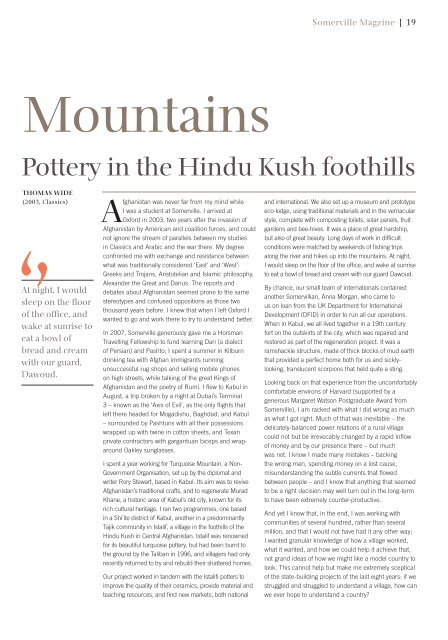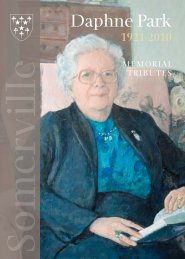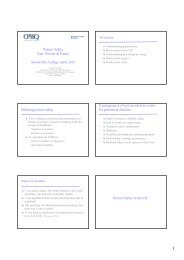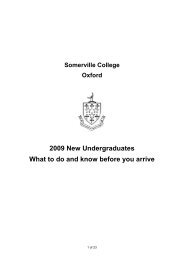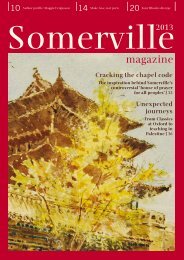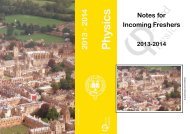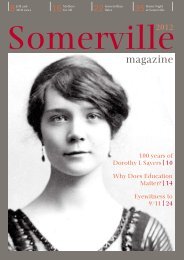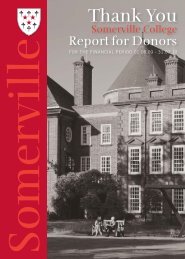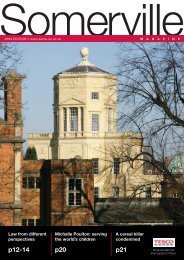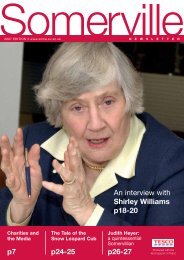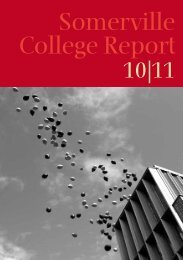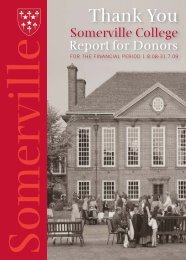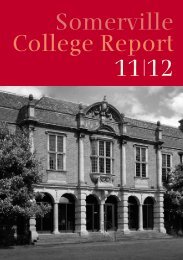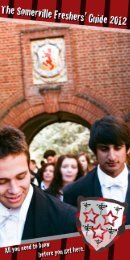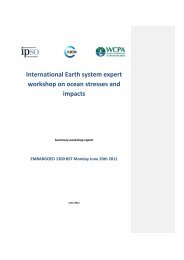magazine - Somerville College - University of Oxford
magazine - Somerville College - University of Oxford
magazine - Somerville College - University of Oxford
Create successful ePaper yourself
Turn your PDF publications into a flip-book with our unique Google optimized e-Paper software.
<strong>Somerville</strong> Magzine | 19<br />
Mountains<br />
Pottery in the Hindu Kush foothills<br />
THOMAS WIDE<br />
(2003, Classics) Afghanistan was never far from my mind while<br />
I was a student at <strong>Somerville</strong>. I arrived at<br />
<strong>Oxford</strong> in 2003, two years after the invasion <strong>of</strong><br />
Afghanistan by American and coalition forces, and could<br />
not ignore the stream <strong>of</strong> parallels between my studies<br />
in Classics and Arabic and the war there. My degree<br />
confronted me with exchange and resistance between<br />
what was traditionally considered ‘East’ and ‘West’:<br />
Greeks and Trojans, Aristotelian and Islamic philosophy,<br />
At night, I would<br />
sleep on the floor<br />
<strong>of</strong> the <strong>of</strong>fice, and<br />
wake at sunrise to<br />
eat a bowl <strong>of</strong><br />
bread and cream<br />
with our guard,<br />
Dawoud.<br />
Alexander the Great and Darius. The reports and<br />
debates about Afghanistan seemed prone to the same<br />
stereotypes and confused oppositions as those two<br />
thousand years before. I knew that when I left <strong>Oxford</strong> I<br />
wanted to go and work there to try to understand better.<br />
In 2007, <strong>Somerville</strong> generously gave me a Horsman<br />
Travelling Fellowship to fund learning Dari (a dialect<br />
<strong>of</strong> Persian) and Pashto; I spent a summer in Kilburn<br />
drinking tea with Afghan immigrants running<br />
unsuccessful rug shops and selling mobile phones<br />
on high streets, while talking <strong>of</strong> the great Kings <strong>of</strong><br />
Afghanistan and the poetry <strong>of</strong> Rumi. I fl ew to Kabul in<br />
August, a trip broken by a night at Dubai’s Terminal<br />
3 – known as the ‘Axis <strong>of</strong> Evil’, as the only fl ights that<br />
left there headed for Mogadishu, Baghdad, and Kabul<br />
– surrounded by Pashtuns with all their possessions<br />
wrapped up with twine in cotton sheets, and Texan<br />
private contractors with gargantuan biceps and wraparound<br />
Oakley sunglasses.<br />
I spent a year working for Turquoise Mountain, a Non-<br />
Government Organisation, set up by the diplomat and<br />
writer Rory Stewart, based in Kabul. Its aim was to revive<br />
Afghanistan’s traditional crafts, and to regenerate Murad<br />
Khane, a historic area <strong>of</strong> Kabul’s old city, known for its<br />
rich cultural heritage. I ran two programmes, one based<br />
in a Shi’ite district <strong>of</strong> Kabul, another in a predominantly<br />
Tajik community in Istalif, a village in the foothills <strong>of</strong> the<br />
Hindu Kush in Central Afghanistan. Istalif was renowned<br />
for its beautiful turquoise pottery, but had been burnt to<br />
the ground by the Taliban in 1996, and villagers had only<br />
recently returned to try and rebuild their shattered homes.<br />
Our project worked in tandem with the Istalifi potters to<br />
improve the quality <strong>of</strong> their ceramics, provide material and<br />
teaching resources, and find new markets, both national<br />
and international. We also set up a museum and prototype<br />
eco-lodge, using traditional materials and in the vernacular<br />
style, complete with composting toilets, solar panels, fruit<br />
gardens and bee-hives. It was a place <strong>of</strong> great hardship,<br />
but also <strong>of</strong> great beauty. Long days <strong>of</strong> work in difficult<br />
conditions were matched by weekends <strong>of</strong> fishing trips<br />
along the river and hikes up into the mountains. At night,<br />
I would sleep on the floor <strong>of</strong> the <strong>of</strong>fice, and wake at sunrise<br />
to eat a bowl <strong>of</strong> bread and cream with our guard Dawoud.<br />
By chance, our small team <strong>of</strong> internationals contained<br />
another Somervillian, Anna Morgan, who came to<br />
us on loan from the UK Department for International<br />
Development (DFID) in order to run all our operations.<br />
When in Kabul, we all lived together in a 19th century<br />
fort on the outskirts <strong>of</strong> the city, which was repaired and<br />
restored as part <strong>of</strong> the regeneration project. It was a<br />
ramshackle structure, made <strong>of</strong> thick blocks <strong>of</strong> mud earth<br />
that provided a perfect home both for us and sicklylooking,<br />
translucent scorpions that held quite a sting.<br />
Looking back on that experience from the uncomfortably<br />
comfortable environs <strong>of</strong> Harvard (supported by a<br />
generous Margaret Watson Postgraduate Award from<br />
<strong>Somerville</strong>), I am racked with what I did wrong as much<br />
as what I got right. Much <strong>of</strong> that was inevitable – the<br />
delicately-balanced power relations <strong>of</strong> a rural village<br />
could not but be irrevocably changed by a rapid infl ow<br />
<strong>of</strong> money and by our presence there – but much<br />
was not. I know I made many mistakes – backing<br />
the wrong man, spending money on a lost cause,<br />
misunderstanding the subtle currents that fl owed<br />
between people – and I know that anything that seemed<br />
to be a right decision may well turn out in the long-term<br />
to have been extremely counter-productive.<br />
And yet I know that, in the end, I was working with<br />
communities <strong>of</strong> several hundred, rather than several<br />
million, and that I would not have had it any other way;<br />
I wanted granular knowledge <strong>of</strong> how a village worked,<br />
what it wanted, and how we could help it achieve that,<br />
not grand ideas <strong>of</strong> how we might like a model country to<br />
look. This cannot help but make me extremely sceptical<br />
<strong>of</strong> the state-building projects <strong>of</strong> the last eight years: if we<br />
struggled and struggled to understand a village, how can<br />
we ever hope to understand a country?


